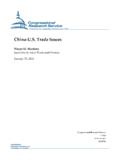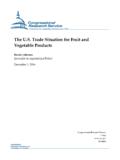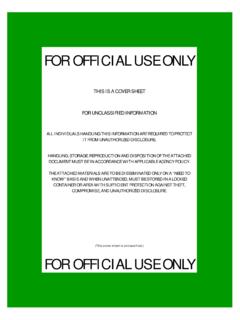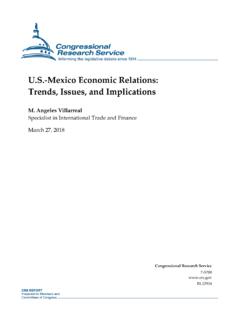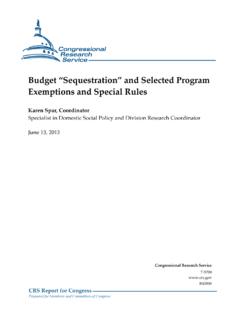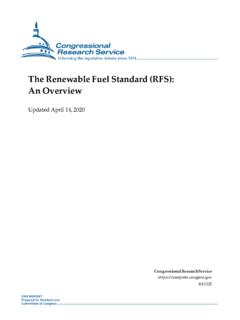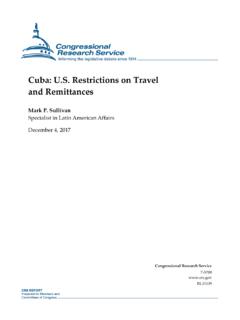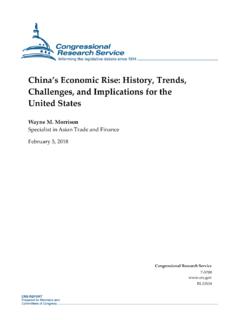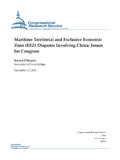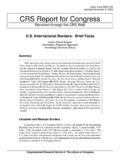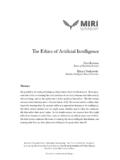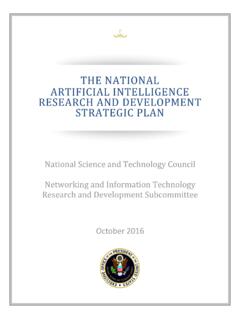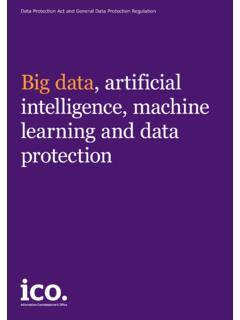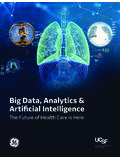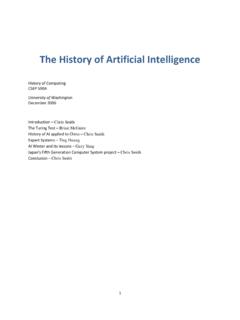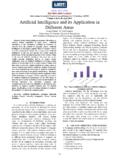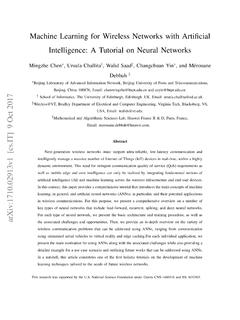Transcription of Artificial Intelligence and National Security
1 Artificial Intelligence and National Security Daniel S. Hoadley US Air Force Fellow Nathan J. Lucas Section Research Manager April 26, 2018 Congressional Research Service 7-5700 R45178 Artificial Intelligence and National Security Congressional Research Service Summary Artificial Intelligence (AI) is a rapidly growing field of technological development with potentially significant implications for National Security . As such, the Department of Defense (DOD) is developing AI applications for a range of military functions. AI research is underway in the fields of Intelligence collection and analysis, logistics, cyberspace operations, command and control, and a variety of military autonomous vehicles.
2 AI applications are already playing a role in operations in Iraq and Syria, with algorithms designed to speed up the target identification process. Congressional action has the potential to shape the technology s trajectory, with fiscal and regulatory decisions potentially influencing growth of National Security applications and the standing of military AI development versus international competitors. AI technology presents unique challenges for military acquisitions, especially since the bulk of AI development is happening in the commercial sector.
3 Although AI is not unique in this regard, the Defense Acquisition Process (DAP) may potentially need to be adapted for acquiring systems like AI. In addition, many commercial AI applications must undergo significant modification prior to being functional for the military. A number of cultural issues challenge AI acquisition, leading to discord with AI companies and potential military aversion to adapting weapons systems and processes to this disruptive technology. International rivals in the AI market are creating pressure for the United States to compete for innovative military AI applications.
4 China is a leading competitor in this regard, releasing a plan in 2017 to capture the global lead in AI development by 2030. Currently, China is primarily focused on using AI to make faster and more well-informed decisions, as well as developing multiple types of autonomous military vehicles. Russia is also active in military AI development, with a primary focus on robotics. Although AI has the potential to impart a number of advantages in the military context, it may also introduce distinct challenges. AI technology can facilitate autonomous operations, lead to more informed military decision-making, and will likely increase the speed and scale of military action.
5 However, it is also unpredictable, vulnerable to unique forms of manipulation, and presents challenges to human-machine interaction. Analysts hold a broad range of opinions on how influential AI will be in future combat operations. While a small number of analysts believe that the technology will have minimal impact, a larger number of experts believe that AI will have at least an evolutionary if not revolutionary effect. Military AI development presents a number of potential issues for Congress What is the right balance of commercial and government funding for AI development?
6 How might Congress influence Defense Acquisition reform initiatives that ease military AI adaptation? What changes, if any, are necessary in Congress and DOD to implement effective oversight of AI development? What regulatory changes are necessary for military AI applications? What measures can be taken to protect AI from exploitation by international competitors and preserve a advantage in the field? Artificial Intelligence and National Security Congressional Research Service Contents Introduction .. 1 AI Definitions and Terminology.
7 1 Issues for Congress .. 4 AI Applications for Defense .. 8 Intelligence , Surveillance, and Reconnaissance .. 9 Logistics .. 9 Cyberspace .. 10 Command and Control .. 10 Autonomous Vehicles .. 11 Lethal Autonomous Weapon Systems (LAWS) .. 12 AI Acquisitions Challenges .. 13 International Competition .. 17 China .. 17 Russia .. 21 International Institutions .. 23 AI Opportunities and Challenges .. 24 Autonomy .. 24 Speed .. 26 Scaling .. 27 Information Superiority .. 28 Predictability .. 28 Explainability .. 31 AI Exploitation .. 33 AI s Impact on Combat.
8 34 Minimal Impact on Combat .. 34 Evolutionary Impact on Combat .. 35 Revolutionary Impact on Combat .. 36 Figures Figure 1. Categories of AI Applications .. 3 Figure 2. Relationships of Selected AI Terminology .. 4 Figure 3. DOD Spending on AI: FY2012-FY2017 .. 5 Figure 4. Chinese Investment in AI Companies, 2010-2017 .. 20 Figure 5. Value of Autonomy to DOD Missions .. 25 Figure 6. Human vs. Machine Decision-making .. 26 Figure 7. AI and Image Classifying Errors .. 29 Figure 8. AI and Context .. 30 Figure 9. Adversarial Images .. 33 Artificial Intelligence and National Security Congressional Research Service Tables Table 1.
9 Taxonomy of Historical AI Definitions .. 3 Contacts Author Contact Information .. 38 Artificial Intelligence and National Security Congressional Research Service 1 Introduction Artificial Intelligence (AI) is a rapidly growing field of technological development that is capturing the attention of international rivals, leaders in the commercial sector, defense intellectuals, and policymakers alike. On July 20, 2017, the Chinese government released a strategy detailing its plan to capture the lead in AI by 2030, and less than two months later Vladimir Putin publicly announced Russia s intent to pursue AI technologies, stating, [W]hoever becomes the leader in this field will rule the world.
10 1 Elon Musk, the Chief Executive Officer of SpaceX and founder of OpenAI, submitted a letter co-signed by 114 international leaders in the technology sector to the United Nations (UN) warning that autonomous weapons fueled by AI will permit armed conflict to be fought at a scale greater than ever, and at timescales faster than humans comprehend and appealing for the means to prevent an arms race and protect civilians from potential In the meantime, the military is already integrating AI systems into combat via a spearhead initiative called Project Maven, which is using AI algorithms to identify insurgent targets in Iraq and These events raise several questions that Congress addressed in hearings during 2017.
